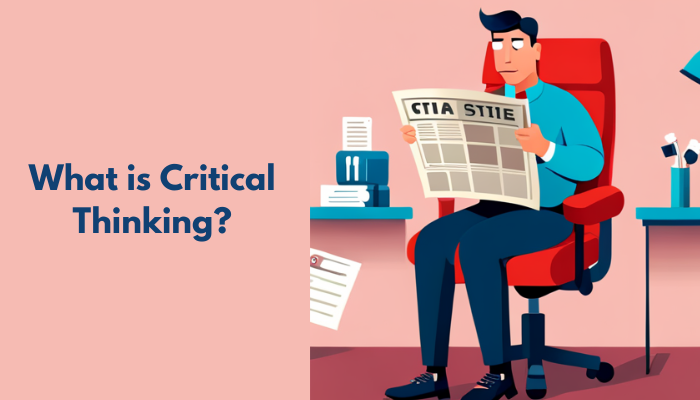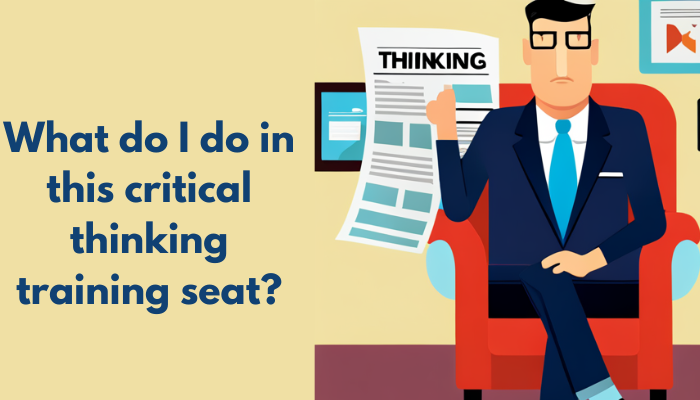With the world changing so rapidly around us, critical thinking is needed now more than ever. Critical thinking is great, but what the heck is critical thinking and how can it help you change your life? This article will take you through Important tips to develop critical thinking and why is it so important for any of us.
What is Critical Thinking?

| Aspect | Positive | Negative |
|---|---|---|
| Decision Making | Enhances decision-making by evaluating information objectively and considering multiple perspectives. | Can lead to analysis paralysis, where overthinking causes delays in making decisions. |
| Problem Solving | Improves problem-solving skills by identifying underlying issues and generating effective solutions. | May result in overcomplicating simple problems or solutions. |
| Innovation | Fosters creativity and innovation by encouraging questioning of the status quo and exploring new ideas. | Risk of resistance from those who prefer traditional approaches or solutions. |
| Communication | Enhances communication by helping articulate well-reasoned arguments and understand different viewpoints. | Can lead to conflicts if different perspectives are not managed respectfully. |
| Adaptability | Improves adaptability by enabling individuals to adjust to new information and changing circumstances. | May create discomfort or frustration when challenged to rethink established beliefs or practices. |
It is thinking deeply about something, analysing the information without bias or prejudice – as objectively as you can then making a rational judgement. This require clear and logical thinking, the ability to understand relationships among ideas. This is one of the key critical thinking skills and it will improve your ability to solve problems, make decisions, and communicate in a way that could change your life positively.
Why Critical Thinking Matters
It will help you to make rational decisions not only in your personal life but also professionally. It save you from cognitive biases, identifies logical fallacies and patterns the mind to solve problems with a structure.
Advantages of Critical Thinking
Critical thinking is necessary for creative expression, problem-solving and requires good judgement skills. By becoming skilled in this, you empower yourself to take on complicated topics with conviction and eloquence; which will help unequivocally grow your career.
Components of Critical Thinking
| Component | Positive | Negative |
|---|---|---|
| Analysis | Helps in breaking down complex information into manageable parts, improving understanding and evaluation. | Can be time-consuming and may lead to over-analysis, potentially delaying decision-making. |
| Evaluation | Allows for assessing the credibility and relevance of information, leading to more informed conclusions. | May lead to skepticism or doubt if too much emphasis is placed on evaluating sources. |
| Inference | Facilitates drawing logical conclusions and making reasoned judgments based on evidence. | Risk of jumping to conclusions if evidence is incomplete or misinterpreted. |
| Reasoning | Enhances the ability to construct coherent arguments and solve problems effectively. | Can result in rigid thinking if reasoning is not flexible or open to new information. |
| Reflection | Promotes self-awareness and continuous improvement by evaluating one’s own thought processes and biases. | May lead to self-doubt or excessive focus on one’s limitations rather than strengths. |
This table outlines the various components of critical thinking, highlighting their benefits and
You have to learn what goes into making critical thinking first! These include:
Observation
Observing is the act of obtaining information about the world based on what you personally see, hear, taste and touch. This is the beginning of critical thinking and it provides a base for further analysis.
Analysis
Analysis After collecting information, the next thing you have to do is analyze it. That is to say deconstructing complex data into more manageable pieces. In the analysis, you find patterns and connections between things as well as principles that tie them together.
Interpretation
That is, interpretation relates to understanding the results of your analysis. This includes definitely conclusions, inferences and a general understanding of the data.
How To Become A Thoughtful Critic
Critical thinking skills need practice and a great deal of work. How to do it Take the following stepsExercise your way there
Ask Questions
Critical thinking is driven by curiosity. Be curious, ask questions to understand better and question assumptions (yours or others’). Now, let’s examine some things about the “why” and how every situation.
When this makes sense, reflect on how you are thinking.
Think about how you think, how you frame problems and make decisions. It provides self reflection to what needs you can possibly fill up on.
Engage in Active Learning
Active learning – going after useful information and experiences. Some are through reading either reports, papers or articles; other times this is done by attending in talks at workshops and discussions. The more you know, the less likely you are to accept as true whatever toxic piece of folly comes your way.
Practice Problem-Solving
Engage in problem-solving activities regularly. Kids brainteasers and kids jigsaw puzzles are some of the best ways to develop critical thinking.
Getting (Un)Stuck on the Path to Critical Thinking
There are many barriers, preventing you from thinking critically. Developing solid critical thinking skills requires identifying and working through these barriers.
Cognitive Biases
Cognitive biases, on the other hand are mental errors that take place when we attempt to think and make sense of our surrounds. Help make sure you have take aways to reduce the result of these prejudices.
Emotional Influences
Inflated emotions disrupt the act of thinking clearly. IndependenceStarting with Third Stage, one learns how to manage his/her emotions and maintain objectivity..
Lack of Information
You can make better decisions with more information. Make sure that you reflect, find reliable sources and have a full understanding of the topic.
Critical Thinking applied to Day-to-Day Life
Puzzle-solving may be a hobby, but critical thinking is not reserved for things as dramatic and global as solving our broken society. You can practice critical thinking in all areas of your life, this is how:
Personal Decisions
Take responsibility for your health, finances and relationships by using common sense. Determine the advantages and disadvantages of each alternative as wellfor possible future consequences.
Professional Contexts
Critical thinking is a high-demand skill that can help you prepare for your career and improve work performance. These are features that can help you to address complicated projects, manage conflicts and create a new way of work in organisation.
Social Interactions
Opt for Critical thinkingCritical thought is essential when it comes to boosting your communication and interpersonal skills. It helps you see other sides of the story, have some good discussions and connect your relationships better.
Education: Improving Critical Skills
Critical thinking abilities are developed by means of education The following are strategies educators may choose to incorporate that encourage them in which they guide students so as.
Encourage Questioning
Provide an open and non-judgemental learning climate (for more information here) Encourage them to investigate alternative perspectives and openly question assumptions.
Promote Active Learning
Use active learning pedagogies like group discussions, debates and hands-on activities. These methods get students involved and give a deeper insight into the subject.
Incorporation of Critical Thinking in Curriculum
Create a curriculum centered around the exploration of critical thinking skills across all subjects. Apply critical thinking with real-world cases
Critical thinking and the role of technology
There are plenty of tools and resources technology provides for improved critical thinking skills. Now, how can you use technology to inculcate critical thinking?
Online Courses
Opt for online classes on critical thinking and problem-solving. Coursera and edX) – These are online learning platforms that feature multiple classes from professors who know what they talk about.
Educational Apps
Utilize ed-tech apps that enhance critical thinking ability. We all know apps such as Lumosity and Peak where you get to exercise your brain with logic games, right?
Interactive Simulations
Interactive simulations provide a kinesthetic method of learning They are privy to It offers you the liberty of trying various alternatives and seeing how your decisions will play out.
Critical Thinking in the Future
Obviously, in the future, critical thinking is a necessity. Read On to Understand Why You Should Elevate this Skill.
Adapting to Change
The world is constantly changing – and learning to think critically will enable you timely adapt yourself according new challenges or opportunities. It allows you to read the future and make decisions.
Ethical Decision-Making
The further we progress in technology, the more difficult situations like this will arise. In this tangled world, critical thinking gives you the same name as a sense to make ethically sound decisions.
Lifelong Learning
Critical thinking also creates a sense of learning never ends. It promotes exploration, curiosity and continuous improvement – as a human being, creative and professional.
What do I do in this critical thinking training seat?
| Pros | Cons |
|---|---|
| Enhanced Problem-Solving Skills | Time Commitment: Training can be time-consuming, which may impact other responsibilities. |
| Improved Decision-Making | Variable Quality: The effectiveness of the training can vary depending on the instructor and curriculum. |
| Better Analytical Abilities | Potential Overwhelm: The complexity of critical thinking concepts can be overwhelming for some participants. |
| Increased Creativity and Innovation | Application Challenges: Applying critical thinking skills in real-world scenarios may require additional practice. |
| Enhanced Communication Skills | Cost: Some critical thinking training programs can be expensive, requiring financial investment. |
FAQ-Frequently Asked Questions
What is critical thinking?
Critical thinking is the objective analysis of facts to form a judgment. It would require the ability to analyze data, see logical linkages and consequences of a decision including questioning assumptions that do not make sense when set against reality as well as vetting whether one perspective suchas political in nature equally valid in economic terms.
So, why is critical thinking significant?
Critical thinking Critical by creating well-informed decisions Problem-solving (analysis) Enough understanding of complex issues. It is an essential skill that benefits personal, academic and professional development.
What can I do to develop my critical thinking?
All of the attributes mentioned above are skills that can be developed over time, provided you work on them. What you can do: Ask Questions Reflect on your thought process Engage in active learning Problem-solving practice, etc.
Is it possible to learn critical thinking?
Critical thinking can, however, be taught and learned through education and practice. Teachers can cultivate this by encouraging questioning, providing active learning and intertwining it with their commonly delivered curriculum.
What sort of resources are available for building up critical thinking skills?
Well, there is a plethora of tools and resources to do this. These may involve MOOCs, educational app gamified strategies and practices, brain-training tasks or games, interactive simulation.
How critical thinking benefits your work life
One of the best things critical thinking does is it improves job performance and career prospects within a workplace. It walks you through handling challenging projects, resolving disputes and unique proposals to think about as develop a strategy.
Will critical thinking even work in day to day decisions?
Absolutely. Critical thinking with oneself important personal decision-making, such as decisions about your health or finances (or relationships). It was acknowledging the pluses and minuses, what does this mean long term?
What are cognitive biases?
Cognitive biases are patterns of deviation from norm or rationality in judgment, whereby inferences about other people and situations may be drawn-in an illogical fashion. Recognition of the existence of these biases and tendencies can reduce their influence on our thoughts which tends to promote more rational, if not wholly objective thinking.
What does emotion do to our critical thinking?
Emotions may blur the judgement or obstruct rational thoughts. One of the foundational aspects to practical critical thinking is learning how to manage your emotions and be able remain objective in any situation. Emotional influences that you, yourself also recognize by the way motivates you to make much more balanced decisions.
Do we see critical thinking itself to be more important than any of those coming up in the future?
As the world become more interconnected and fast-paced, critical thinking becomes an indispensable trait. Able to adjust with different trends, ethics and make learning as a part of life.







Great job on this project! Your attention to detail and thorough research really stand out
Thank you very much for your feedback
I appreciate your creativity and innovative approach. It added a lot of value to the team
Thank you very much for your feedback
Your problem-solving skills were impressive. You tackled the challenges head-on and delivered excellent results
Thank you very much for your feedback
Fantastic work! Your dedication and hard work really paid off and it shows in the final outcome
Thank you very much for your feedback
You did an amazing job with this presentation. It was clear, engaging, and very well-organized
Thank you very much for your feedback